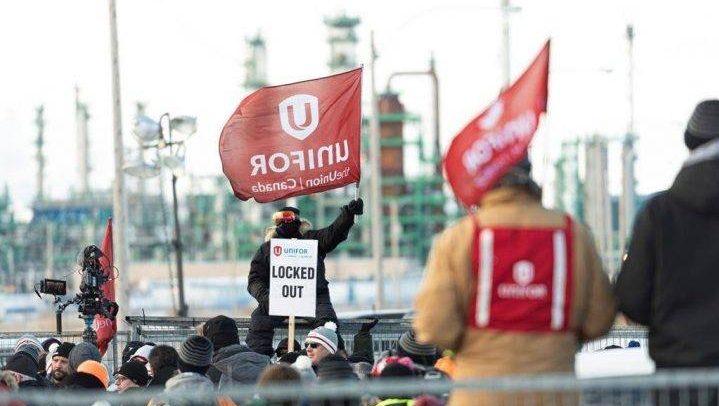Despite a court injunction saying the picket line can only hold up traffic coming and going for a maximum of 10 minutes, the Co-op Refinery Complex remains behind a Unifor barricade.

This barricade has grown since Monday to include campers, several layers of fence and even a volleyball court.
On Monday, Unifor national president Jerry Dias said the national chapter was formally taking over the picket line from Unifor Local 594. Dias said the court order only names Local 594 and the national chapter is legally a separate entity, so they don’t have to abide by the injunction.
Brad DeLorey, spokesperson for Federated Co-operatives Limited (FCL) said the language of the injunction extends to all of Unifor and the blockade of the refinery is illegal.
Chief Evan Bray told the press on Tuesday that the Regina Police Service are consulting with lawyers, Crown prosecutors and other police agencies on how to interpret the injunction.
As of Wednesday, DeLorey said FCL is still considering their legal options on how to handle the blockade.
So how is the picket line able to maintain the barricade of the refinery with this court order in place? Saskatoon-based labour relations lawyer Steve Seiferling said the injunction is missing some important wording.
Seiferling typically represents employers in this type of dispute. Where injunctions like this are warranted, he requests language saying “anyone having knowledge of this injunction” is affected by the order.
“What we’ve done in the past is we asked for that additional language to be included, which means if you present them with a copy of the order they have knowledge of the order and you can enforce it against anyone that’s engaged in picketing activity,” Seiferling explained.
With the lack of this language, Seiferling said he sees how Unifor arrived at their stance that the injunction does not apply to the national chapter.
In the injunction, “Unifor” is solely defined as Unifor Canada, Local 594.
However, Seiferling does not think Unifor would have a hard time swaying the court with their argument.
“There’s still an argument here. I understand where Unifor’s coming from on this one, and I understand where the management’s coming from on this one,” Seiferling said.
On Wednesday, leaders from other labour groups including CUPE and the Saskatchewan Federation of Labour voiced their solidarity with the locked-out Unifor workers on the picket line.
While this took place, FCL voiced their pleasure in a judge hitting Unifor Local 594 with a $100,000 for violating a prior injunction. That temporary order limited the stalling of traffic access and egress to a maximum of five minutes.
Both sides have said they want to return to the bargaining table, but remain far apart on the issue of pensions.
Unifor represents some Global News employees.


Comments